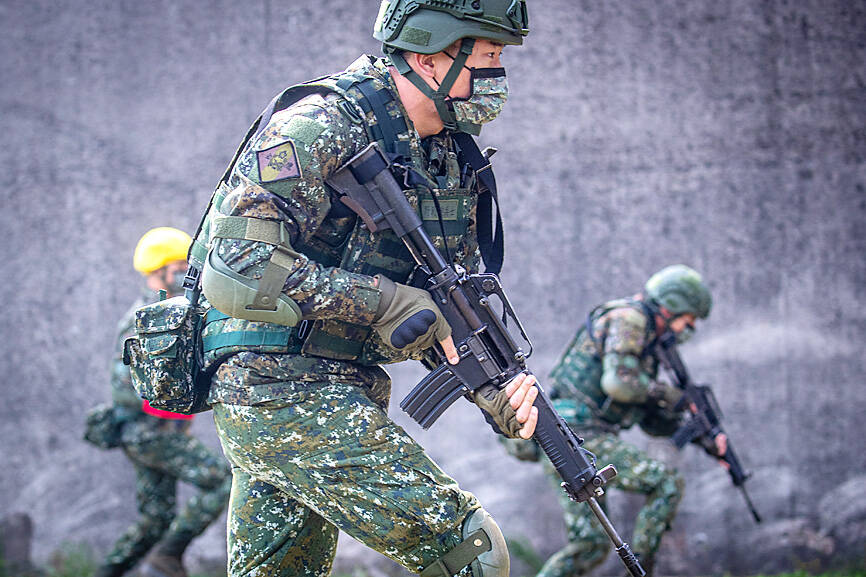Proposed amendments to the General Mobilization Act (全民防衛動員準備法) are not yet final, the Executive Yuan spokesman said yesterday, after the Chinese Nationalist Party (KMT) vowed to block the legislation over concerns about mobilization of young students and its effect on media freedom.
KMT Chairman Eric Chu (朱立倫) on Wednesday pledged that the party would do its utmost to prevent the passage of the revisions, citing concerns over government control of media outlets and the possible mobilization of students during wartime.
According to the amendments proposed by the Ministry of National Defense (MND), local governments and all news and media organizations would have to comply with official restrictions that might be imposed on all information networks, including online media platforms, publishers and television broadcasters.

Photo: Ritchie B. Tongo, EPA-EFE
The amendments would also increase penalties for spreading misinformation and failing to comply with mobilization or requisition orders during wartime.
In addition to the proposed revisions, the MND has asked the Ministry of Education to compile a list of students aged 16 or older and submit it to the All-Out Defense Mobilization Agency.
Local media reports said that these suggest the Democratic Progressive Party (DPP) government is preparing for a general mobilization amid rising cross-strait tensions, sparking concern among parents.
Executive Yuan acting spokesman Lo Ping-cheng (羅秉承) said that it is the government’s responsibility to ensure that all legislation can function to the best of its ability, adding that the MND would consult public opinion before finalizing its proposal.
“Dire times,” as mentioned in the amendments, refer to an emergency order of mobilization issued by the president not only in the event of war, but also severe disasters, such as the 921 Earthquake, Lo said.
Ancillary measures should exist to ensure that the order can be carried out, Lo said, citing the example of the amendment to the Communicable Disease Control Act (傳染病防治法) after the outbreak of SARS in 2002.
The Ministry of Health and Welfare would amend the act again after the COVID-19 pandemic, Lo said, adding that changes are made to ensure that the rule of law continues during times of crisis.
The General Mobilization Act is outdated, as its lacks preparations to mobilize services such as finance and information technology, and the amendments seek to fill in these shortcomings, he said.
Restrictions brought about by implementing emergency measures would only occur in times of mobilization, but it is best to have such measures ready beforehand, he added.
Rumors of “mobilizing students and sending them into battle” is “obviously fake news,” Lo said, adding that the proposed amendments should be discussed rationally instead of being blown out of proportion.
DPP caucus convener Cheng Yun-peng (鄭運鵬) said that discussion of the amendments is good and should not be deterred because of objections from China or pro-unification individuals.
DPP Legislator Liu Shih-fang (劉世芳) said it was regretful that some members of the public have been affected by China’s cognitive warfare regarding the amendments, adding that making a list of students for mobilization was standing policy.
Liu suggested that the defense ministry and the education ministry gather opinions opposing the amendments and review the revisions to reach a public consensus.

Three passengers and the assailant were reportedly injured in a knife attack on the Taichung MRT on Tuesday. The Rapid Transit Brigade of the Taichung Police Department is still investigating the incident, with no motive immediately apparent. Taichung Police Commissioner Lee Wen-chang (李文章) said that at least four people were injured in the attack, and the suspect has been taken into custody. The incident occurred at about 11:15am on a train car near Taichung City Hall Station. Witnesses reported seeing a man attacking others with a knife, while other passengers tried to grab his hair or fend him off with umbrellas. Three people were reportedly

‘OBNOXIOUS MAN’: The KMT’s Chen Ching-hui moved into Chung Chia-pin’s path atop the podium and reached for him before he grabbed at her legs with both hands Democratic Progressive Party Legislator Chung Chia-pin (鍾佳濱) yesterday said he slipped and lost his balance, and did not know who was around him, after jumping onto the speaker’s podium at the legislature in Taipei. He apologized after a collision with Chinese Nationalist Party (KMT) Legislator Chen Ching-hui (陳菁徽), who moved to intercept him as he mounted the podium. There was pushing and shoving when the session started in the morning as KMT lawmakers attempted to block access to the podium to shield Legislative Speaker Han Kuo-yu (韓國瑜) so he could preside over the session. Video footage showed Chung step on a chair and

While it is common to see bumper stickers informing other drivers about important information, such as “baby on board” or “rookie driver,” some motorist in Taiwan are using creative statements to warn other drivers to keep a safe distance to avoid a collision. A photograph recently circulating on the Internet showed a van in Changhua City with a bumper sticker saying that the driver received their license after taking the test three times, so it is dangerous to drive close to the vehicle. The person who took the photograph said all vehicles behind the van appeared to “subconsciously” maintaining a safe distance. Some

Taipei police on Saturday arrested 24 female Thai tourists on suspicion of working as hostesses and engaging in illegal activities at an underground bar in Zhongshan District (中山), the distict’s police precinct said in a statement yesterday. The police also arrested five other people involved in the operation, including the 29-year-old bar owner surnamed Chiang (蔣), and 17 customers, the statement said. The 24 Thai women were fined an undisclosed amount in accordance with the Social Order Maintenance Act (社會秩序維護法) by the police and transferred to a National Immigration Agency (NIA) special brigade in Taipei for repatriation to Thailand. The cases of